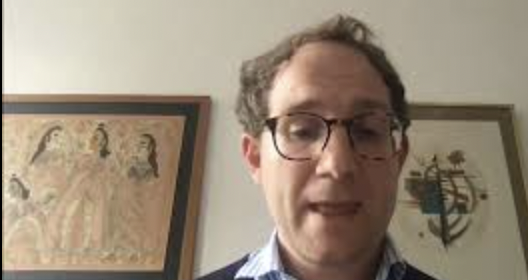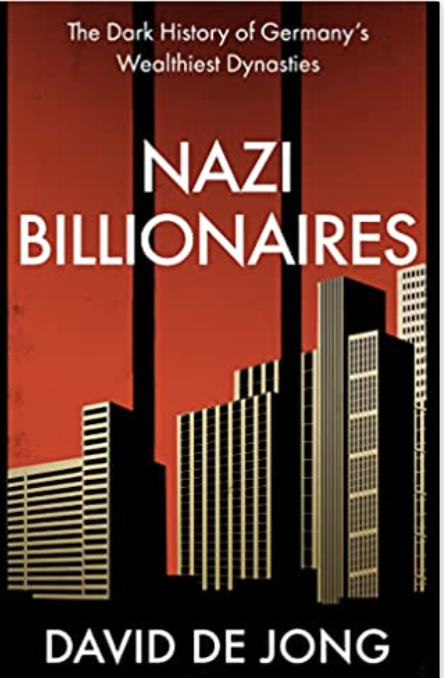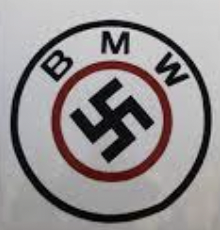
“German business dynasties continue to sidestep a complete reckoning with, the dark history that stains their fortunes.”



An investigation of how the Nazis helped German tycoons make billions from the horrors of the Third Reich and World War II and how the world allowed them to get away with it.
When Porsche makes its planned public debut later this year, the descendants of the sports car manufacturer’s eponymous founder an SS officer who was Hitler’s favoured auto engineer – will be the main beneficiaries of Germany’s largest listing in decades. The family of Adolf Rosenberger, a German Jew who co-founded the company will not get properly compensated for his shares, which Ferdinand Porsche and his son-in-law bought for a fraction of their true worth in 1935, the same year that Rosenberger was arrested by the Gestapo for the crime of dating a gentlewoman. David Je Joung, a Dutch journalist investigates for Bloomberg the origins of German industrialists’ wealth, some of which remains invested in the country’s most famous brands. De Jong quotes Rosenberger, who later assumed the name Alan Robert after fleeing to California in 1940 contending that his co-founders “used my membership as a Jew to get rid of me cheaply”. He challenges the Porsche family’s post0war claim that they had petitioned for Rosenberger’s release and treated him fairly in matters of business.
De Joung focuses on four figures who would, despite their or their clan’s crimes, re-emerge as West Germany’s richest businessmen within two or three decades of Hitler’s defeat.
Coal and Steel baron Friedrich Flick was convicted in Nuremberg for the use of slave labour, among other crimes, only to regain his stature and fortune once he had served and commuted a seven-year sentence. A charitable foundation bearing his name still exists and sponsors academic positions at Frankfurt’s prestigious Goethe University.
August von Finck got off almost scot-free thanks in. part to the admission of dubious persilscheine or Persil tickets.- exculpatory affidavits by Jews or other Nazi victims vouching for his character and conduct, His family bank, Merck Finck – whose balance sheet had been quadrupled by the forced acquisition of rival lenders Dreyfus and Rothschild sold to Barclays for roughly $370mn in 1990. A history page on the company’s website conveniently skips from the 1870s to 1954.
Rudolf- August Oetker, heir to a pudding and frozen goods empire, who volunteered to join the Waffen-SS, never even saw the inside of a courtroom, and went on to employ and support former prominent Nazis.
In 1946, Günther Quandt born on 28th July 1881, was a German industrialist who founded an industrial empire that today includes BMW and Altan, a car and chemical company respectively, whose descendants own 47 per cent of shares in BMW, and whose family name still adorns one of Germany’s most prestigious journalism prizes. Quandt’s father Günther successfully portrayed himself in the postwar account as a reluctant collaborator with the Nazi regime, paving the way for a new era of “massive prosperity and grave silence”, de Hong writes.
The record cited in this book ( including letters and diaries, the author procured from antiquarian book dealers, details how Günther Quandt, if not necessarily an enthusiastic party member, capitalised on the rise of fascism, and his connection to Joseph Goebbels, Hitler’s future propaganda minister, who married his ex-wife Magda Ritschel, two years after divorcing Günther Quandt. Joseph Goebbels’s nefarious activities included, but were not limited to, expropriating Jewish assets, manufacturing weapons, and exploiting tens of thousands of forced labourers. The workers recounted beatings, mistreatment, and even deaths at the factory in the film which premiered at the Hamburg Film festival. The allegation that the family’s assets can be traced back to the time of the Third Reich defrauds fifty years of entrepreneurial success of the part my great grandfather Emil and my grandfather Günther Quandt before the year 1933”.
Some of corporate Germany’s former sins have been well documented elsewhere, and the likes of Volkswagen and Deutsche Bank have commissioned historians to lay bare their misdeeds.
De Jong chronicles in a brief chapter, that clemency was granted to many perpetrators when the Truman administration’s priorities shifted to ensuring the West German economy was strong enough to join the fight against communism. Only recently has public pressure and dogged journalism forced a re-examination of those swiftly exonerated, overlooked crimes, such as Nazi participation of Germany’s richest and most secretive family, the Reimann’s, De Jong writes many German business dynasties continue to sidestep a complete reckoning with, the dark history that stains their fortunes.”
De Jong’s revelations provide an uncomfortable backdrop to current boardroom decisions. VW, one of the largest exploiters of forced labour in the Nazi era, continues to operate a factory in China’s Xinjiang region, where President Xi Jinping‘s regime stands accused of committing genocide against the Uyghur Muslim minority, As does BASF, the world’s largest chemical’s company, which under its wartime incarnation, JG Farben, manufactured Zyklon B or Nazi gas chambers. Both groups say they have no evidence of human rights abuses at their plants.
A reckoning with historical responsibilities has also been notably absent in German industry’s lobbying to ensure Russian gas keeps flowing into the country, even as this helps Vladimir Putin finance his war in Ukraine.
Nazi Billionaires: The Dark History of Germany’s Wealthiest Dynasties by David de Jong, William Collins £25/ Mariner Books $28.99, 400 pages.
